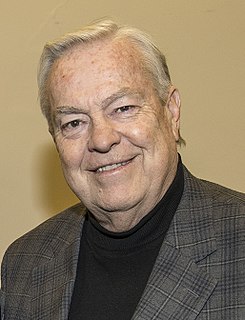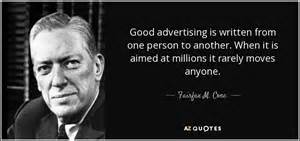A Quote by Jef I. Richards
There is a huge difference between journalism and advertising. Journalism aspires to truth. Advertising is regulated for truth. I'll put the accuracy of the average ad in this country up against the average news story any time.
Quote Topics
Related Quotes
Boxes and rectangles on the side or top of a website simply do not deliver against brand advertising goals. Like it or not, boxes and rectangles have for the most part become the province of direct response advertising, or brand advertising that pays, on average, as if it's driven by direct response metrics.
I got in journalism for any number of reasons, not least because it's so much fun. Journalism should be in the business of putting pressure on power, finding out the truth, of shining a light on injustice, of, when appropriate, being amusing and entertaining - it's a complicated and varied beast, journalism.
Every journalism bromide - speaking truth to power, comforting the afflicted, afflicting the powerful - that otherwise would be hopelessly sappy to a journalist of any experience, has become a Twitter grail. The true business of journalism has become obscured because there is really no longer a journalism business.
Journalism continues to go south, thanks to big media and its strangulation of news, and there's not much left in the way of community or local media. Add to that an internet that has not even started thinking seriously about how it supports journalism. You have these big companies like Google and Facebook who run the news and sell all the ads next to it, but what do they put back into journalism? It isn't much.
Anyone who does investigative journalism is not in it for the money. Investigative journalism by nature is the most work intensive kind of journalism you can take on. That's why you see less and less investigative journalism at newspapers and magazines. No matter what you're paid for it, you put in so many man-hours it's one of the least lucrative aspects of journalism you can take on.
I think everybody's talking about like facts and truth and you know like that 'We're here to fact check' and all of that, that's the base material of journalism. You cannot have journalism without facts and truth. But if facts and truth were what actually you know sort of moved people's lives and moved their decision-making like the election would have had a different outcome.
Of course, there is some truth in advertising. There's yeast in bread, but you can't make bread with yeast alone. Truth in advertising is like leaven, which a woman hid in three measures of meal. It provides a suitable quantity of gas, with which to blow out a mass of crude misrepresentation into a form that the public can swallow.



































